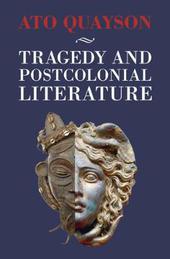
|
Tragedy and Postcolonial Literature
Hardback
Main Details
Description
This book examines tragedy and tragic philosophy from the Greeks through Shakespeare to the present day. It explores key themes in the links between suffering and ethics through postcolonial literature. Ato Quayson reconceives how we think of World literature under the singular and fertile rubric of tragedy. He draws from many key works - Oedipus Rex, Philoctetes, Medea, Hamlet, Macbeth, and King Lear - to establish the main contours of tragedy. Quayson uses Shakespeare's Othello, Chinua Achebe, Wole Soyinka, Tayeb Salih, Arundhati Roy, Toni Morrison, Samuel Beckett and J.M. Coetzee to qualify and expand the purview and terms by which Western tragedy has long been understood. Drawing on key texts such as The Poetics and The Nicomachean Ethics, and augmenting them with Frantz Fanon and the Akan concept of musuo (taboo), Quayson formulates a supple, insightful new theory of ethical choice and the impediments against it. This is a major book from a leading critic in literary studies.
Author Biography
Ato Quayson is Professor of English at Stanford University, California. He has previously taught at the University of Cambridge, the University of Toronto, and at New York University, and has held fellowships at the University of Oxford, Harvard University, the University of California, Berkeley, Australian National University, and Wellesley College, among others.
Reviews'... a rich and capacious book. Each chapter engages in detailed and extended contemplation of the facets of a single text.' Rajeswari Sunder Rajan, Modern Philology '... [This book] is a powerful insight, suggestive enough, one would have thought, to fuel a book-length inquiry into the distinctiveness of postcolonial tragedy.' Rajeswari Sunder Rajan, Modern Philology 'The book's connections to the fields of literature, philosophy, and history are apparent, as is its layered, meticulously crafted thesis. Relevant and applicable to a variety of critical reassessments in various fields within the humanities. Recommended.' J. Neal, Choice
|